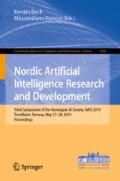Abstract
Autonomy refers to a system that decides and performs actions motivated by some intended objectives, and those actions are justifiable by sound reasoning with respect to these objectives. Artificial intelligence (AI) is here intended as the technology that enables autonomy. Artificially intelligent autonomous robots are predicted to play an increasingly important role in the energy industry capability to address the society demand for energy. The development of such advanced systems needs to start with defining AI and autonomy for asset owners in the energy industry. In general, different applications will require different engineering definitions of AI and different levels of autonomy.
Access this chapter
Tax calculation will be finalised at checkout
Purchases are for personal use only
References
Chen, H., Stavinoha, S., Walker, M., Zhang, B., Fuhlbrigge, T.: Opportunities and challenges of robotics and automation in offshore oil and gas industry. Intell. Control Autom. 5, 136–145 (2014)
Shukla, A., Karki, H.: A review of robotics in onshore oil-gas industry. In: International Conference of Mechatronics and Automation, pp. 1153–1160 (2013)
Norvig, P., Russell, S.J.: Artificial Intelligence: A Modern Approach, 3rd edn. Prentice Hall, Upper Saddle River (2018)
Rich, E., Knight, K.: Artificial Intelligence. McGraw-Hill, New York (1991)
Kurzweil, R.: The Age of Intelligent Machines. MIT Press, Cambridge (1990)
Schultz, M.A., Goodrich, A.C.: Human-robot interaction: a survey. Found. Trends Hum. Comput. Interact. 1(3), 203–275 (2007)
Vagia, M., Transeth, A.A., Fjerdingen, S.A.: A literature review on the levels of automation during the years. What are the different taxonomies that have been proposed? Appl. Ergon. 53, 190–202 (2015)
SAE International: Taxonomy and Definitions for Terms Related to Driving Automation Systems for On-Road Motor Vehicles (2018)
Norwegian Forum for Autonomous Ships (NFAS): Definitions for Autonomous Merchant Ships (2017)
Sheridan, T.B., Verplank, W.L.: Human and Computer Control for Undersea Teleoperators. Massachusetts Institute of Technology, Man-Machine Systems Laboratory (1978)
Proud, R.W., Hart, J.J., Mrozinski, R.B.: Methods for determining the level of autonomy to design into a human spaceflight vehicle: a function specific approach, NASA (2005)
National Institute of Standards and Technology (NIST): Autonomy Levels for Unmanned Systems (ALFUS) framework v2.0, NIST Special Publication 1011-I-2.0 (2008)
Riley, V.: A general model of mixed-initiative human-machine systems. In: 33rd Annual Meeting of the Human Factors Society, vol. 33, no. 2, pp. 124–128 (1989)
Ingrand, F., Ghallab, M.: Deliberation for autonomous robots: a survey. Artif. Intell. 247, 10–44 (2017)
Author information
Authors and Affiliations
Corresponding author
Editor information
Editors and Affiliations
Rights and permissions
Copyright information
© 2019 Springer Nature Switzerland AG
About this paper
Cite this paper
Scibilia, F., Tungland, K.S., Røyrøy, A., Asla, M.B. (2019). Energy Industry Perspective on the Definition of Autonomy for Mobile Robots. In: Bach, K., Ruocco, M. (eds) Nordic Artificial Intelligence Research and Development. NAIS 2019. Communications in Computer and Information Science, vol 1056. Springer, Cham. https://doi.org/10.1007/978-3-030-35664-4_9
Download citation
DOI: https://doi.org/10.1007/978-3-030-35664-4_9
Published:
Publisher Name: Springer, Cham
Print ISBN: 978-3-030-35663-7
Online ISBN: 978-3-030-35664-4
eBook Packages: Computer ScienceComputer Science (R0)

